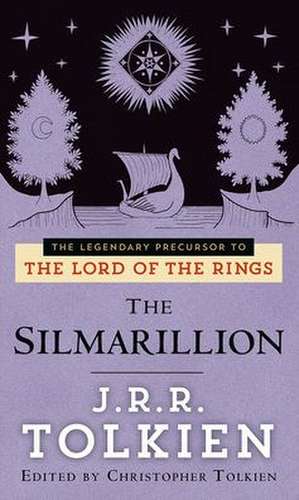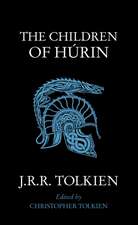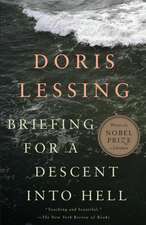The Silmarillion
Autor J. R. R. Tolkien Editat de Christopher Tolkienen Limba Engleză Hardback – 31 dec 1984 – vârsta de la 14 până la 18 ani
TIME
Those interested in J.R.R. Tolkien's Middle Earth should not be without this grand volume that tells the tragic tale of the struggle for control of the Silmarils, a struggle that would determine the history of the world long before the War of the Ring.
| Toate formatele și edițiile | Preț | Express |
|---|---|---|
| Paperback (3) | 53.15 lei 3-5 săpt. | |
| Del Rey Books – 31 dec 1984 | 53.15 lei 3-5 săpt. | |
| HarperCollins Publishers – 8 ian 1992 | 57.80 lei 3-5 săpt. | +10.54 lei 4-10 zile |
| HarperCollins Publishers – aug 2013 | 64.02 lei 3-5 săpt. | +10.95 lei 4-10 zile |
| Hardback (4) | 132.72 lei 3-5 săpt. | |
| Perfection Learning – 31 dec 1984 | 132.72 lei 3-5 săpt. | |
| HarperCollins Publishers – 6 ian 1992 | 174.18 lei 17-23 zile | +15.10 lei 4-10 zile |
| HarperCollins Publishers – 18 mar 2021 | 246.66 lei 3-5 săpt. | +54.24 lei 4-10 zile |
| HarperCollins Publishers – 5 noi 2007 | 467.07 lei 3-5 săpt. | +51.50 lei 4-10 zile |
Preț: 132.72 lei
Nou
25.40€ • 26.42$ • 20.97£
Carte disponibilă
Livrare economică 25 martie-08 aprilie
Specificații
ISBN-10: 081242302X
Pagini: 442
Dimensiuni: 107 x 173 x 33 mm
Greutate: 0.29 kg
Ediția:2
Editura: Perfection Learning
Extras
There was Eru, the One, who in Arda is called Ilúvatar; and he made first the Ainur, the Holy Ones, that were the offspring of his thought, and they were with him before aught else was made. And he spoke to them, propounding to them themes of music; and they sang before him, and he was glad. But for a long while they sang only each alone, or but few together, while the rest hearkened; for each comprehended only that part of the mind of Ilúvatar from which he came, and in the understanding of their brethren they grew but slowly. Yet ever as they listened they came to deeper understanding, and increased in unison and harmony.
And it came to pass that Ilúvatar called together all the Ainur and declared to them a mighty theme, unfolding to them things greater and more wonderful than he had yet revealed; and the glory of its beginning and the splendour of its end amazed the Ainur, so that they bowed before Ilúvatar and were silent.
Then Ilúvatar said to them: ‘Of the theme that I have declared to you, I will now that ye make in harmony together a Great Music. And since I have kindled you with the Flame Imperishable, ye shall show forth your powers in adorning this theme, each with his own thoughts and devices, if he will. But I will sit and hearken, and be glad that through you great beauty has been wakened into song.
Then the voices of the Ainur, like unto harps and lutes, and pipes and trumpets, and viols and organs, and like unto countless choirs singing with words, began to fashion the theme of Ilúvatar to a great music; and a sound arose of endless interchanging melodies woven in harmony that passed beyond hearing into the depths and into the heights, and the places of the dwelling of Ilúvatar were filled to overflowing, and the music and the echo of the music went out into the Void, and it was not void. Never since have the Ainur made any music like to this music, though it has been said that a greater still shall be made before Ilúvatar by the choirs of the Ainur and the Children of Ilúvatar after the end of days. Then the themes of Ilúvatar shall be played aright, and take Being in the moment of their utterance, for all shall then understand fully his intent in their part, and each shall know the comprehension of each, and Ilúvatar shall give to their thoughts the secret fire, being well pleased.
But now Ilúvatar sat and hearkened, and for a great while it seemed good to him, for in the music there were no flaws. But as the theme progressed, it came into the heart of Melkor to interweave matters of his own imagining that were not in accord with the theme of Ilúvatar; for he sought therein to increase the power and glory of the part assigned to himself. To Melkor among the Ainur had been given the greatest gifts of power and knowledge, and he had a share in all the gifts of his brethren. He had gone often alone into the void places seeking the Imperishable Flame; for desire grew hot within him to bring into Being things of his own, and it seemed to him that Ilúvatar took no thought for the Void, and he was impatient of its emptiness. Yet he found not the Fire, for it is with Ilúvatar. But being alone he had begun to conceive thoughts of his own unlike those of his brethren.
Some of these thoughts he now wove into his music, and straight-way discord arose about him, and many that sang nigh him grew despondent, and their thought was disturbed and their music faltered; but some began to attune their music to his rather than to the thought which they had at first. Then the discord of Melkor spread ever wider, and the melodies which had been heard before foundered in a sea of turbulent sound. But Ilúvatar sat and hearkened until it seemed that about his throne there was a raging storm, as of dark waters that made war one upon another in an endless wrath that would not be assuaged.
Then Ilúvatar arose, and the Ainur perceived that he smiled; and he lifted up his left hand, and a new theme began amid the storm, like and yet unlike to the former theme, and it gathered power and had new beauty. But the discord of Melkor rose in uproar and contended with it, and again there was a war of sound more violent than before, until many of the Ainur were dismayed and sang no longer, and Melkor had the mastery. Then again Ilúvatar arose, and the Ainur perceived that his countenance was stern; and he lifted up his right hand, and behold! a third theme grew amid the confusion, and it was unlike the others. For it seemed at first soft and sweet, a mere rippling of gentle sounds in delicate melodies; but it could not be quenched, and it took to itself power and profundity. And it seemed at last that there were two musics progressing at one time before the seat of Ilúvatar, and they were utterly at variance. The one was deep and wide and beautiful, but slow and blended with an immeasurable sorrow, from which its beauty chiefly came. The other had now achieved a unity of its own; but it was loud, and vain, and endlessly repeated; and it had little harmony, but rather a clamorous unison as of many trumpets braying upon a few notes. And it essayed to drown the other music by the violence of its voice, but it seemed that its most triumphant notes were taken by the other and woven into its own solemn pattern.
In the midst of this strife, whereat the halls of Ilúvatar shook and a tremor ran out into the silences yet unmoved, Ilúvatar arose a third time, and his face was terrible to behold. Then he raised up both his hands, and in one chord, deeper than the Abyss, higher than the Firmament, piercing as the light of the eye of Ilúvatar, the Music ceased.
* * *
Then Ilúvatar spoke, and he said: ‘Mighty are the Ainur, and mightiest among them is Melkor; but that he may know, and all the Ainur, that I am Ilúvatar, those things that ye have sung, I will show them forth, that ye may see what ye have done. And thou, Melkor, shalt see that no theme may be played that hath not its uttermost source in me, nor can any alter the music in my despite. For he that attempteth this shall prove but mine instrument in the devising of things more wonderful, which he himself hath not imagined.
Then the Ainur were afraid, and they did not yet comprehend the words that were said to them; and Melkor was filled with shame, of which came secret anger. But Ilúvatar arose in splendour, and he went forth from the fair regions that he had made for the Ainur; and the Ainur followed him.
But when they were come into the Void, Ilúvatar said to them: ‘Behold your Music!’ And he showed to them a vision, giving to them sight where before was only hearing; and they saw a new World made visible before them, and it was globed amid the Void, and it was sustained therein, but was not of it. And as they looked and wondered this World began to unfold its history, and it seemed to them that it lived and grew. And when the Ainur had gazed for a while and were silent, Ilúvatar said again: ‘Behold your Music! This is your minstrelsy; and each of you shall find contained herein, amid the design that I set before you, all those things which it may seem that he himself devised or added. And thou, Melkor, wilt discover all the secret thoughts of thy mind, and wilt perceive that they are but a part of the whole and tributary to its glory.
And many other things Ilúvatar spoke to the Ainur at that time, and because of their memory of his words, and the knowledge that each has of the music that he himself made, the Ainur know much of what was, and is, and is to come, and few things are unseen by them. Yet some things there are that they cannot see, neither alone nor taking counsel together; for to none but himself has Ilúvatar revealed all that he has in store, and in every age there come forth things that are new and have no foretelling, for they do not proceed from the past. And so it was that as this vision of the World was played before them, the Ainur saw that it contained things which they had not thought. And they saw with amazement the coming of the Children of Ilúvatar, and the habitation that was prepared for them; and they perceived that they themselves in the labour of their music had been busy with the preparation of this dwelling, and yet knew not that it had any purpose beyond its own beauty. For the Children of Ilúvatar were conceived by him alone; and they came with the third theme, and were not in the theme which Ilúvatar propounded at the beginning, and none of the Ainur had part in their making. Therefore when they beheld them, the more did they love them, being things other than themselves, strange and free, wherein they saw the mind of Ilúvatar reflected anew, and learned yet a little more of his wisdom, which otherwise had been hidden even from the Ainur.
Now the Children of Ilúvatar are Elves and Men, the Firstborn and the Followers. And amid all the splendours of the World, its vast halls and spaces, and its wheeling fires, Ilúvatar chose a place for their habitation in the Deeps of Time and in the midst of the innumerable stars. And this habitation might seem a little thing to those who consider only the majesty of the Ainur, and not their terrible sharpness; as who should take the whole field of Arda for the foundation of a pillar and so raise it until the cone of its summit were more bitter than a needle; or who consider only the immeasurable vastness of the World, which still the Ainur are shaping, and not the minute precision to which they shape all things therein. But when the Ainur had beheld this habitation in a vision and had seen the Children of Ilúvatar arise therein, then many of the most mighty among them bent all their thought and their desire towards that place. And of these Melkor was the chief, even as he was in the beginning the greatest of the Ainur who took part in the Music. And he feigned, even to himself at first, that he desired to go thither and order all things for the good of the Children of Ilúvatar, controlling the turmoils of the heat and the cold that had come to pass through him. But he desired rather to subdue to his will both Elves and Men, envying the gifts with which Ilúvatar promised to endow them; and he wished himself to have subjects and servants, and to be called Lord, and to be a master over other wills.
But the other Ainur looked upon this habitation set within the vast spaces of the World, which the Elves call Arda, the Earth; and their hearts rejoiced in light, and their eyes beholding many colours were filled with gladness; but because of the roaring of the sea they felt a great unquiet. And they observed the winds and the air, and the matters of which Arda was made, of iron and stone and silver and gold and many substances: but of all these water they most greatly praised. And it is said by the Eldar that in water there lives yet the echo of the Music of the Ainur more than in any substance else that is in this Earth; and many of the Children of Ilúvatar hearken still unsated to the voices of the Sea, and yet know not for what they listen.
Now to water had that Ainu whom the Elves call Ulmo turned his thought, and of all most deeply was he instructed by Ilúvatar in music. But of the airs and winds Manwë most had pondered, who is the noblest of the Ainur. Of the fabric of Earth had Aulë thought, to whom Ilúvatar had given skill and knowledge scarce less than to Melkor; but the delight and pride of Aulë is in the deed of making, and in the thing made, and neither in possession nor in his own mastery; wherefore he gives and hoards not, and is free from care, passing ever on to some new work.
And Ilúvatar spoke to Ulmo, and said: ‘Seest thou not how here in this little realm in the Deeps of Time Melkor hath made war upon thy province? He hath bethought him of bitter cold immoderate, and yet hath not destroyed the beauty of thy fountains, nor of thy clear pools. Behold the snow, and the cunning work of frost! Melkor hath devised heats and fire without restraint, and hath not dried up thy desire nor utterly quelled the music of the sea. Behold rather the height and glory of the clouds, and the everchanging mists; and listen to the fall of rain upon the Earth! And in these clouds thou art drawn nearer to Manwë, thy friend, whom thou lovest.
Then Ulmo answered: ‘Truly, Water is become now fairer than my heart imagined, neither had my secret thought conceived the snowflake, nor in all my music was contained the falling of the rain. I will seek Manwë, that he and I may make melodies for ever to thy delight!’ And Manwë and Ulmo have from the beginning been allied, and in all things have served most faithfully the purpose of Ilúvatar.
Descriere
A new B-format edition of this novel, designed to take fans of The Hobbit and The Lord of the Rings deeper into the myths and legends of Middle-earth
The Silmarillion is an account of the Elder Days, of the First Age of Tolkien’s world. It is the ancient drama to which the characters in The Lord of the Rings look back, and in whose events some of them such as Elrond and Galadriel took part. The tales of The Silmarillion are set in an age when Morgoth, the first Dark Lord, dwelt in Middle-Earth, and the High Elves made war upon him for the recovery of the Silmarils, the jewels containing the pure light of Valinor.
Included in the book are several shorter works. The Ainulindale is a myth of the Creation and in the Valaquenta the nature and powers of each of the gods is described. The Akallabeth recounts the downfall of the great island kingdom of Númenor at the end of the Second Age and Of the Rings of Power tells of the great events at the end of the Third Age, as narrated in The Lord of the Rings.
This pivotal work features the revised, corrected text and includes, by way of an introduction, a fascinating letter written by Tolkien in 1951 in which he gives a full explanation of how he conceived the early Ages of Middle-earth.


















